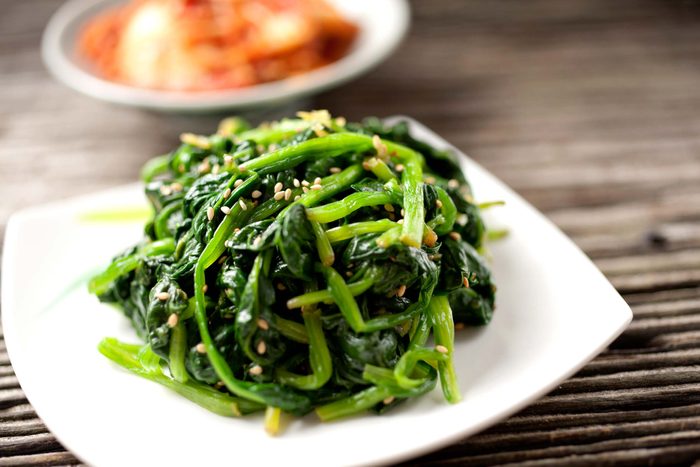
It improves blood glucose levels
There’s a reason (actually, many reasons) why spinach is called a diabetic superfood. Just one cup has 40 percent of your recommended daily serving of magnesium, which can help regulate blood sugars. The leafy greens contain the antioxidant alpha-lipoic acid, which lowers glucose levels and boosts insulin sensitivity, according to researchers at Oregon State University. Its low glycemic index keeps you safe from unexpected blood sugar spikes. (Don’t miss these other 15 best superfoods for diabetics.)

It reduces your cancer risk
Adding more spinach to your diet is just one of many simple ways you can prevent cancer. Along with leafy veggies like kale, lettuce, and chard, spinach contains carotenoids, pigments found in plants that act as antioxidants to eliminate potentially dangerous free radicals. According to the American Institute of Cancer Research, foods with carotenoids can reduce the risk of certain breast cancers. Don’t miss these other 37 ways to lower your risk of cancer.

It lowers blood pressure
You can keep a high blood pressure in check using natural remedies—like these 18 drug-free blood pressure treatments—and stocking up on foods that work into the DASH diet. Significant amounts of potassium, folate, and magnesium put spinach in this important category. (Find out the foods that lower high blood pressure.) In some cases, these lifestyle changes alone aren’t enough, and your doctor may put you on medication.

It boosts bone health
Spinach is a bit complicated when it comes to bone health. It’s loaded with calcium, but it also contains oxalates that make it hard for the body to absorb that calcium. However, the National Osteoporosis Foundation says one of the benefits of spinach is that it’s a valuable source of vitamin K, which is proven to increase bone density and can even prevent fractures. (These are the silent signs you have osteoporosis.) So here’s the compromise: Next time you make a spinach salad, include cheese or a non-dairy calcium source to get the benefits of both for your bones.

It eases your constipation
Fiber is the go-to nutrient for bathroom troubles. Since spinach has soluble and insoluble fiber, it helps ease you through any blockage; one cup of cooked spinach offers 4.3 grams which is 17 percent of the recommended daily intake. Here’s how you can add more fiber to your diet.

It puts iron in your diet
Just one cup of cooked spinach contains more than 6 milligrams of iron. That may not seem like a lot, but it makes up 36 percent of your daily recommended intake. So that one cup covers about one-third of your daily recommended servings, which is especially good news for vegetarians. Try these yummy ways to sneak more spinach into your meals.

It keeps your nails and hair healthy
Spinach has high amounts of vitamins A and C, both of which act as natural beauty products, according to the International Food Information Council. Vitamin A helps produce a substance called sebum that lubricates our skin and hair. In addition to absorbing all that previously mentioned iron, vitamin C keeps hair growing strong and long, with the help of the protein collagen. Vitamin C and collagen also make a great team for strengthening your nails and, as a result, preventing annoying hang nails. Next, find out just how much iron spinach really has.

It has more potassium than a banana
Really? Really. If you compare 100 grams of spinach to 100 grams of bananas, the spinach has significantly more potassium (200 mg more, to be exact). Potassium is known to improve bone health and maintain normal digestive and muscular functions. Plus, it can help lower the risk of osteoporosis and stroke. Check out these other foods that cut your risk of stroke.

It helps your eyesight
Move over, carrots. Another benefit of spinach is it has one of the most important vitamins for your eyes: lutein. This antioxidant can reduce your risk of cataracts and age-related macular degeneration, according to the American Optometric Association. Who knew carrots weren’t the only food that improve your eyesight? Don’t miss these other foods that reduce your risk of macular degeneration.

It promotes weight-loss
With a mere 6.9 calories in one cup of spinach, adding a few cups to your meal won’t put a dent in your diet. But that’s not the only way the benefits of spinach could help you shed pounds. A study published in the Journal of the American College of Nutrition discovered that taking spinach extract (a concentrated form of the plant’s leaves) can keep you full and reduce cravings long after the meal is over, likely thanks to tiny compartments in spinach leaves called thylakoids. Add a handful of spinach to your eggs in the morning to beat cravings at lunch and beyond. Later in the day, use spinach greens with these other surprising salad tricks that help you lose weight.

It helps you recover from injuries
Spinach is an insane source of vitamin K, with 181 percent of your daily needs in each serving. The vitamin helps your blood clot when you’re injured, so getting your daily dose is important to recovery. There’s increasing evidence that vitamin K could help your heart as a whole, too. A 2018 study published in the Journal of Nutrition looked at 766 adolescents and found that the hearts of those who ate the least vitamin K1 were 3.3 times more likely to have an unhealthily large major pumping chamber. That’s pretty persuasive. But, now that you’ve heard all the positives, discover the cases when spinach might be bad for your health—for example for those who are on blood thinners.